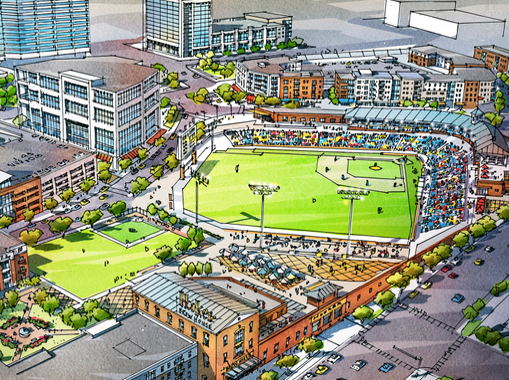
Here’s an interesting twist in discussions of a new Hartford ballpark for the New Britain Rock Cats (Class AA; Eastern League): It would be cheaper for the city to borrow the money and build the facility, as opposed to working with a private developer.
Residents and some political leaders virulently opposed the original plan by Mayor Pedro Segarra for the city to bond and construction a new Rock Cats ballpark in downtown Hartford, arguing that the city shouldn’t be in the business of building ballparks. Fair enough, said Segarra: we’ll let the process open to bids and seek a private developer on the project. Fairly soon afterwards the city settled on DoNo Hartford LLC as a development partner.
But there’s a hitch: because of the way the deal is structured, it will actually cost the city more to go ahead with the private developer, as opposed to directly bonding the project. The biggest reason why: it’s a whole lot cheaper for cities to borrow money than private firms, and under the proposal the city is backing the financing without actually bonding the project. That commits the city to renting a ballpark from the developer, as opposed to owning it all along. From the Hartford Courant:
Here’s how the deal shapes up: DoNo Hartford proposed to build a $47.1 million ballpark and lease it to the city for 25 years at 8 percent a year, or $3.8 million. Three times during the lease period, the city’s cost would rise by 5 percent, reaching $4.4 million a year in years 16 through 25.
The city’s average annual payment would be $4.1 million over the life of the lease.
Under city bonding, if the project qualified as tax-free, general obligation debt, Hartford would pay $2.9 million a year for the same $47.1 million over 25 years, based on its current rating of AA-minus at a basic borrowing rate of 3.66 percent plus fees and add-ons, according to a source who structures these kinds of deals.
Now, these numbers are preliminary and still under negotiation, so it’s entirely likely the amount paid by the city under a private-development plan will come down. Rock Cats rent of $500,000 a year — rising to $600,000 annually down the line — certainly will help offset those city payments. And city officials say they expect development in the area to raise revenues from tax collections in the northern downtown area, helping to pay down that debt as well.
So why is the city pursuing a plan that will likely cost taxpayers more down the road? Politics. There are those who argue the city shouldn’t be in the ballpark business, so this structure appeases them. And there are those who argue that if the city is bonding, it should be bonding for things other than a new ballpark. But make no mistake: once the city decided that using a new downtown Hartford ballpark as part of a larger economic-development package, the current route will likely be the most expensive one.
RELATED STORIES: City settles on Hartford ballpark developer; council to discuss; Solomon: Rock Cats still committed to Hartford move; Rock Cats avoid eviction, pay property taxes; Two ballpark development projects make the cut in Hartford; Four Hartford ballpark developments submitted; New Britain plays hardball with Rock Cats over unpaid property taxes; Hartford pulls public bonding for new Rock Cats ballpark; Backlash emerging against new Hartford ballpark; Hartford: New ballpark already attracting development; Why are Rock Cats moving to Hartford? Follow the money; Hartford ballpark plan: 10,000 capacity, $60M price tag; Rock Cats negotiating move to Hartford: report
—-
Share your news with the baseball community. Send it to us at editors@augustpublications.com.
Are you a subscriber to the weekly Ballpark Digest newsletter? You can sign up for a free subscription at the Newsletter Signup Page.
Join Ballpark Digest on Facebook and on Twitter!
Follow Ballpark Digest on Google + and add us to your circles!
